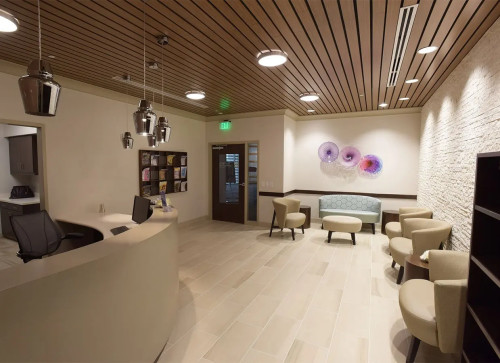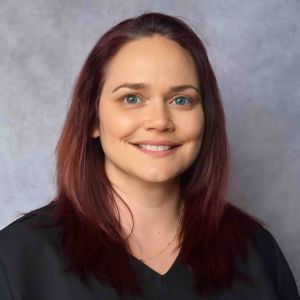






Bariatric Counseling Center of San Antonio
Treatment Focus
You can get treatment for eating disorders at this center, helping you navigate symptoms, build coping tools, and restore your physical health under expert care.
Primary Level of Care
Outpatient treatment offers flexible therapeutic and medical care without the need to stay overnight in a hospital or inpatient facility. Some centers offer intensive outpatient program (IOP), which falls between inpatient care and traditional outpatient service.
Claimed
Recovery.com has connected directly with this treatment provider to validate the information in their profile.
Treatment Focus
You can get treatment for eating disorders at this center, helping you navigate symptoms, build coping tools, and restore your physical health under expert care.
Primary Level of Care
Outpatient treatment offers flexible therapeutic and medical care without the need to stay overnight in a hospital or inpatient facility. Some centers offer intensive outpatient program (IOP), which falls between inpatient care and traditional outpatient service.
Provider's Policy
We are in network with most commercial health insurers, including Community First, Curative, Sana, 90 Degrees, Imagine Health, Healthcare Highways, and the insurances in the list.
Bariatric Counseling Center of San Antonio
Bariatric Counseling Center of San Antonio
About Bariatric Counseling Center of San Antonio
Bariatric Counseling Center, located in San Antonio, Texas, specializes in helping individuals struggling with weight management, overeating, and binge eating disorder. They offer an intensive outpatient program (IOP) that blends medical expertise, mental health support, and lifestyle guidance to promote lasting health and happiness.
Connect with a Community Focused on Wellness
Their approach blends evidence-based therapies, such as individual and group counseling, with holistic practices like cooking classes and movement education. By addressing the physical, emotional, and social aspects of well-being, the program provides personalized care. Unique features, including chef-prepared meals and hands-on learning, equip clients with practical skills and foster a supportive community, enhancing long-term success.

Center Overview
Treatment Focus
You can get treatment for eating disorders at this center, helping you navigate symptoms, build coping tools, and restore your physical health under expert care.
Joint Commission Accredited
The Joint Commission accreditation is a voluntary, objective process that evaluates and accredits healthcare organizations (like treatment centers) based on performance standards designed to improve quality and safety for patients. To be accredited means the treatment center has been found to meet the Commission's standards for quality and safety in patient care.
Insurance Accepted
Cash Pay Rates
Estimated Cash Pay Rate
Center pricing can vary based on program and length of stay. Contact the center for more information. Recovery.com strives for price transparency so you can make an informed decision.
Meet Your Care Team

Sara Hamilton
Director of Clinical Services
PsyD, Licensed Clinical Psychologist

Nancy Albus
Clinical Advisor
LPC, NCC, CEDS-S

Sara Broussard Garcia
Therapist
R-DMT, LPC

Jennifer Arce
Therapist
LPC-A

Emily Beissner
Therapist
LPC-A

Gabrielle (Gabby) Carvajal
Graduate Student Intern

Chasley Fortune
Director of Dietary Services Dietitian
RD, LD

Rosye Rodea
Dietitian

Leila Bebley
Head Chef

Alicia Coderoni
Holistic Nurse Health Coach
RN, NC-BC

Todd McCord
President

Leloni Gonzales
Director of Admissions

Annabel Rivera
Marketing and Administrative Associate
Levels of Care





Your Care Options
Specializations
Nutrition Counseling
Nutritious food helps patients heal from within, setting them up for mental and bodily wellness as they learn about healthy eating.
Eating Disorders
An eating disorder is a long-term pattern of unhealthy behavior relating to food. Most people with eating disorders have a distorted self-image.
Weight Loss
Programming designed to promote sustainable health and wellness through personalized nutrition and fitness plans.
Who We Treat
Men and Women
Men and women attend treatment for addiction in a co-ed setting, going to therapy groups together to share experiences, struggles, and successes.
Approaches
Holistic
A non-medicinal, wellness-focused approach that aims to align the mind, body, and spirit for deep and lasting healing.
Evidence-Based
A combination of scientifically rooted therapies and treatments make up evidence-based care, defined by their measured and proven results.
Individual Treatment
Individual care meets the needs of each patient, using personalized treatment to provide them the most relevant care and greatest chance of success.
Wellness
Wellness philosophies focus on the physical, mental, and spiritual wellness of each patient, helping them restore purpose with natural remedies.
Therapies
1-on-1 Counseling
Patient and therapist meet 1-on-1 to work through difficult emotions and behavioral challenges in a personal, private setting.
Acceptance and Commitment Therapy (ACT)
This cognitive behavioral therapy teaches patients to accept challenging feelings and make the appropriate changes to reach personal goals.
Nutrition Counseling
Nutritious food helps patients heal from within, setting them up for mental and bodily wellness as they learn about healthy eating.
Weight Loss
Programming designed to promote sustainable health and wellness through personalized nutrition and fitness plans.
Conditions We Treat
Anxiety
Anxiety is a common mental health condition that can include excessive worry, panic attacks, physical tension, and increased blood pressure.
Depression
Symptoms of depression may include fatigue, a sense of numbness, and loss of interest in activities. This condition can range from mild to severe.
Eating Disorders
An eating disorder is a long-term pattern of unhealthy behavior relating to food. Most people with eating disorders have a distorted self-image.
Substances We Treat
Co-Occurring Disorders
A person with multiple mental health diagnoses, such as addiction and depression, has co-occurring disorders also called dual diagnosis.






